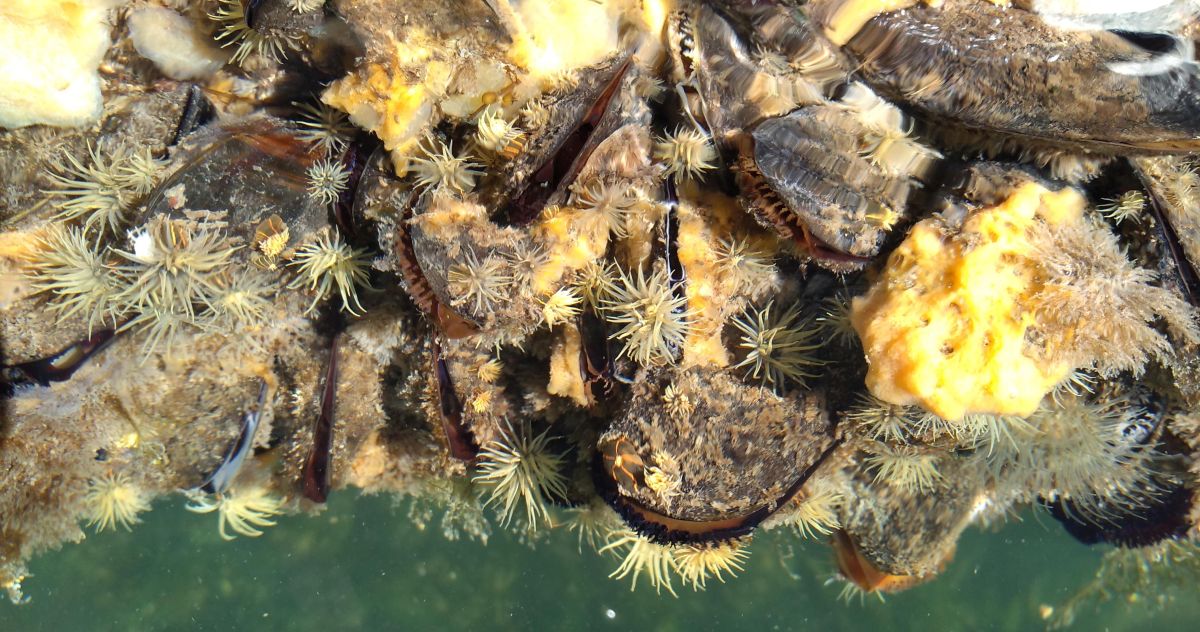02 / 06 / 2020

Next to soil and water, also fouling organisms on wrecks and underwater structures are sampled by PROBIO. © VLIZ (Matthias Sandra)
The role of the Flanders Marine Institute (VLIZ) within the cSBO project PROspection for BIOactive compounds in the North Sea (PROBIO) lies in a scientifically sound selection of 50 local species with a potential for further bioactive screening. VLIZ is also responsible for the sampling of the organisms and uses its research vessel RV Simon Stevin, sampling equipment and the scientific diving team for this.
Subsequently, the Metabolomics Expertise Center of the Flemish Institute for Biotechnology (VIB) will carry out a bioactive screening of the samples. By means of liquid chromatography (LC) and gas chromatography (GC) in combination with High Resolution Mass Spectrometry (HRMS), a “fingerprint” is drawn up for each organism of (primary and secondary) metabolites present. Each sample thus yields different fractions of metabolites, which can then be tested for their bioactive effect.
This is done, on the one hand, in the Laboratory for Toxicology and Pharmacology at KU Leuven. They are looking for bioactive molecules that seem commercially interesting for the medical or agricultural sector (e.g. as insecticide or food supplement). On the other hand, at the Laboratory of Pharmaceutical Microbiology at Ghent University, the fractions are tested for their antimicrobial effect, according to the guidelines of the World Health Organization (WHO) in their global search for new antibiotics for pathogens for which antibiotic resistance occurs (including tuberculosis).
The official kickoff of PROBIO was given in Ostend on 7 November 2019. During the first months of the project, VLIZ drew up a scientifically based longlist of marine species with potential for further bioprospection. After reviewing scientific literature, 147 organisms present in the Belgian part of the North Sea emerged as candidates. In consultation with the Strategic Advisory Board of the project, a shortlist of 50 species is now being selected on which the sampling and screenings will focus. This selection places a strong focus on the industrial needs of Flemish companies to promote their market developments (for biorefining, aquaculture, biotechnology, etc). However, the seasonal availability of the organisms and the feasibility of sampling in our unpredictable North Sea must also be taken into account.
Like many other research and innovation projects, the PROBIO project is delayed due to the COVID-19 pandemic. For example, the March 2020 sampling campaign on board RV Simon Stevin could only be partially carried out. Consequently, not all intended species were collected during the first season. Nevertheless, the first samples already offer the partners the opportunity to tighten their protocol and identify possible bottlenecks. In June 2020, a new PROBIO sampling campaign is planned in which various sampling devices (van Veen grab, hyperbenthic carriage, plankton nets, etc.) and the VLIZ scientific diving team are deployed on both near-coastal and offshore locations in the Belgian part of the North Sea. This to collect the widest possible range of marine species from the most diverse marine habitats.
The PROBIO cSBO project is financed by Flanders Innovation & Entrepreneurship (VLAIO) and supported by The Blue Cluster, a Flemish members organisation for sustainable entrepreneurship in blue growth. They also provide the link between the research consortium and Flemish companies, which is of great importance for any follow-up projects.
PROBIO-contacts at VLIZ: